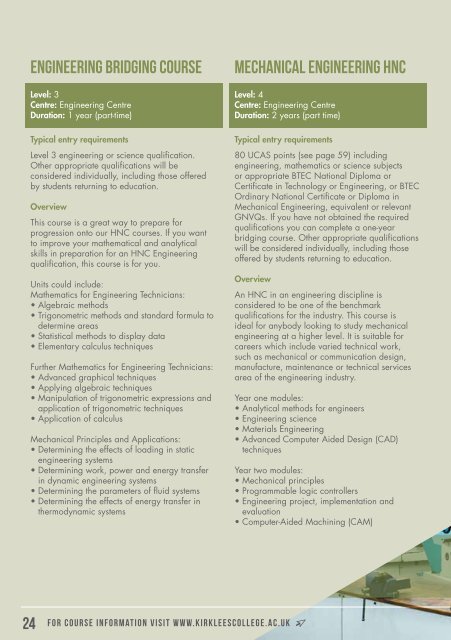HIGHER LEVEL COURSE GUIDE LR
You also want an ePaper? Increase the reach of your titles
YUMPU automatically turns print PDFs into web optimized ePapers that Google loves.
Engineering bridging course<br />
Level: 3<br />
Centre: Engineering Centre<br />
Duration: 1 year (part-time)<br />
Typical entry requirements<br />
Level 3 engineering or science qualification.<br />
Other appropriate qualifications will be<br />
considered individually, including those offered<br />
by students returning to education.<br />
Overview<br />
This course is a great way to prepare for<br />
progression onto our HNC courses. If you want<br />
to improve your mathematical and analytical<br />
skills in preparation for an HNC Engineering<br />
qualification, this course is for you.<br />
Units could include:<br />
Mathematics for Engineering Technicians:<br />
• Algebraic methods<br />
• Trigonometric methods and standard formula to<br />
determine areas<br />
• Statistical methods to display data<br />
• Elementary calculus techniques<br />
Further Mathematics for Engineering Technicians:<br />
• Advanced graphical techniques<br />
• Applying algebraic techniques<br />
• Manipulation of trigonometric expressions and<br />
application of trigonometric techniques<br />
• Application of calculus<br />
Mechanical Principles and Applications:<br />
• Determining the effects of loading in static<br />
engineering systems<br />
• Determining work, power and energy transfer<br />
in dynamic engineering systems<br />
• Determining the parameters of fluid systems<br />
• Determining the effects of energy transfer in<br />
thermodynamic systems<br />
Mechanical Engineering HNC<br />
Level: 4<br />
Centre: Engineering Centre<br />
Duration: 2 years (part time)<br />
Typical entry requirements<br />
80 UCAS points (see page 59) including<br />
engineering, mathematics or science subjects<br />
or appropriate BTEC National Diploma or<br />
Certificate in Technology or Engineering, or BTEC<br />
Ordinary National Certificate or Diploma in<br />
Mechanical Engineering, equivalent or relevant<br />
GNVQs. If you have not obtained the required<br />
qualifications you can complete a one-year<br />
bridging course. Other appropriate qualifications<br />
will be considered individually, including those<br />
offered by students returning to education.<br />
Overview<br />
An HNC in an engineering discipline is<br />
considered to be one of the benchmark<br />
qualifications for the industry. This course is<br />
ideal for anybody looking to study mechanical<br />
engineering at a higher level. It is suitable for<br />
careers which include varied technical work,<br />
such as mechanical or communication design,<br />
manufacture, maintenance or technical services<br />
area of the engineering industry.<br />
Year one modules:<br />
• Analytical methods for engineers<br />
• Engineering science<br />
• Materials Engineering<br />
• Advanced Computer Aided Design (CAD)<br />
techniques<br />
Year two modules:<br />
• Mechanical principles<br />
• Programmable logic controllers<br />
• Engineering project, implementation and<br />
evaluation<br />
• Computer-Aided Machining (CAM)<br />
24<br />
FOR <strong>COURSE</strong> INFORMATION VISIT WWW.KIRKLEESCOLLEGE.AC.UK

















